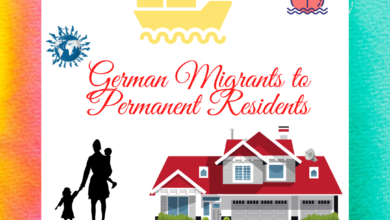German Elections 2025: Major Parties’ Campaign Promises
German Elections 2025: Major Parties’ Campaign Promises
Germany is ready to host a decisive snap election on February 23, 2025. Here is an in-depth overview of the promises from the nation’s major political parties for the German Elections 2025.

.Here, various political parties launched agendas and underlined very basic issues such as the economy, employment, climate protection, and immigration policies. Because each party has its priorities and promises, options are endless, and it leaves the voter confused which party to vote for. Here is an in-depth overview of the promises from Germany’s major political parties for the German elections 2025 and what they may hold for foreign nationals living in Germany.
1) CDU/CSU: Changes in Economic Renewal, Tax Reduction, and Curbing Migration Before German Elections 2025
The center-right Christian Democratic Union (CDU) and Christian Social Union (CSU), led by chancellor candidate Friedrich Merz, centre on reviving the German economy as well as more restrictive policies in migration. CDU/CSU promises:
-
- Tax Reforms: Income taxes reduced, and the rate of corporate tax to 25% should be gradually lowered.
- Pension Policies: Old-age pensions should be maintained and incentives for retirees to work beyond retirement age introduced, with tax-free earnings up to €2,000 per month.
- Migration Policies: Harsher border controls and steps to prevent illegal migration.
The tax cuts, however, are one of the major problems in Merz’s proposals because of the “debt brake” law that Germany has adopted, not allow new debt. However, CDU/CSU remains ahead in the polls. The stress it places on strengthening migration could expose the treatment of foreign nationals in Germany to changes-acting in conjunction with the trend of increasing nationalism within the party.
The conservative shift of the CDU/CSU toward a hardline stance on immigration is partly a reaction to the Afd surge but acts to balance economic worries with security. It may lead to more conservative immigration policies and cutbacks in the support of foreigner integration as the party responds to public concern over increased migration.
2) SPD: Social Justice, Investment Infrastructure, and Progressive policies
The SPD, under the leadership of Chancellor Olaf Scholz, focuses on social justice and investment in infrastructure and public services ahead of the German Elections 2025. Among its most critical proposals are the following:
-
- Debt Brake Reform: To provide billions for public investments in infrastructure.
- Wealth Tax: Proposed tax on those with assets in excess of €100 million.
- Minimum Wage Increase: The legal minimum wage is now €12; it should be increased to €15 per hour.
Traditionally pro-immigration parties have become more cautious about immigration because of the shock and revolt generated by the AfD, taking into account the fact that the SPD emphasises itself to be a party for the relatively poorer classes and has more distributive policy preferences.
They wish to integrate immigrants into society as smoothly as possible, and envision that with the decrease in social inequality, however, this anti-immigrant rhetoric in German politics has compelled the SPD to reposition itself. Multiculturalism would have its strong defenders in the Social Democrats, although foreigners in Germany would be questioned more on the integration and employment policies.
Impact of the SPD (Social Democrats) Policies on foreigners in Germany
The policies of SPD aim to sustain existing laws ahead of the German Elections 2025. They emphasise keeping the current citizenship and, at the same time, establishing an even flow between citizenship, immigration, and integration.
-
- Defending the Citizenship Reform: The party like the Greens defends this law, because they feel the dual modern citizenship is one significant reform for Germans, according to present demographics and socio-political contexts.
- Immigration and Asylum: The SPD focuses on shielding needy people from harm and offers integration courses, and gives immigration authorities proper tools to deal with applications much more readily. Asylum seekers can be given alternative routes, like being shifted to skilled migration visas.
- Faster Application Process: The SPD pledges a faster time frame for asylum application decisions, in six months. It will also ensure faster applications within Germany and the rest of the EU instead of sending out to third regions.
- Deportation Policies: The SPD advocates for the speedy deportation of criminals but rejects pushbacks and instead promotes humane and fair asylum procedures.
- Labour Market and Social Welfare: The party’s pledge to increase the minimum wage to €15 per hour, extend the rent brake, and increase funding for social welfare programs would improve the living conditions of foreign workers and their families.
3) The Greens: Changes regarding Protection of Climate, Pension, and Social Justice Before German Elections 2025
The Greens, under Robert Habeck, have changed their agenda to more far-reaching socio-economic reforms without losing focus on climate protection. Some of their proposals are:
-
- Debt Brake Reform: Financing environmental and economic programs.
- Subsidies to Electric Vehicles: Promote the uptake of EVs as part and parcel of climate goals.
- Citizens’ Fund for Pensions: Establish a state-funded “citizens’ fund” that guarantees secure pensions.
- Wealth Redistribution: Implement the billionaire’s tax for social services, especially education.
The Greens strongly oppose the AfD immigration policy and propose a more open approach ahead of the German Elections 2025. They present policies aimed at encouraging the welcoming of refugees and accelerating the naturalisation process. However, the left-wing party is finding it increasingly difficult to maintain the open attitude toward immigration as the political climate is shifting rightwards. In case the influence of the Greens is on the rise, foreign nationals would most probably be treated more leniently through more lenient policies, including naturalization, and higher integration assistance.
Impact of the Green Party Policies on Foreigners in Germany
The policy measures and manifestos of the Green Party ahead of the German Elections 2025 might bring about wide impacts on foreigners staying in Germany especially regarding citizenship, immigration, and labour market.
-
- Citizenship Reform: The Green Party has been a strong advocate for the citizenship reform that was passed by the previous government, which established a modernised dual citizenship law. The party is dedicated to protecting and preserving this legislation, which is said to reflect the values of a diverse and inclusive society, such as Germany.
- Immigration Policies: As part of the immigration policy, the Greens support simplifying immigration procedures to attract skilled workers and keep Germany an attractive destination for international talent. According to the manifesto, immigration processes must be efficient and attractive towards skilled professionals.
- Support of Asylum Seekers: The Greens aim to protect the rights of asylum seekers and refugees, ensuring speed and fairness, family reunification rights, and well-funded humanitarian aid in the crisis. At the same time, they argue that those who have used up all legal remedies and have no obstacle to deportation have to leave the country as soon as possible.
- Labour Market and Gender Equality: The party champions equal pay and work-life balance for women, working towards a more balanced labour market. Such policies can also help foreign women seeking employment in Germany.
- Economic Contributions: The Green Party’s push for education, affordable housing, and climate-friendly initiatives indirectly benefits foreigners as their environment becomes more inclusive and hospitable.
4) FDP: Business-Friendly Policies and Economic Growth
The Free Democratic Party (FDP), led by Christian Lindner, focuses on economic growth and bureaucracy reduction. The main proposals of this party for the German Elections 2025 are:
-
- Corporate Relief: Relief from taxes on companies suffering from high energy costs.
- Share-Based Pensions: A pension system tied to investments in the stock market.
- Reducing Bureaucracy: Streamlining the administration to make it more efficient.
While the FDP does not stress immigration more than other parties in its program, it has policies that it supports for skilled immigration to fill labour gaps in the German workforce. The economic focus of the FDP may lead towards policies that further foster a more business-friendly environment, which can include attracting international talent. Their stand on immigration could not be as liberal as that of the Greens, but foreigners may have to fulfil a certain economic need to stay within the country’s borders.
5) The Left Party: Welfare, Public Transportation, and Income Redistribution
Social welfare and public services are most emphasised by the Left Party. Their program will feature the following:
-
- Wealth Tax: There shall be an inheritance tax of 60% on estates over €3 million.
- Minimum Wage: Set the minimum wage up to €15 per hour.
- Public Transport: Improve rural public transport networks with local hour-by-hour bus and train services.
- Ban on Short-Haul Flights: Ban flights where a train journey can be covered within five hours.
The Left Party is more in favour of wealth redistribution and better social services, which also include policies that ensure greater access to public services for all residents regardless of their nationality. Its pro-social orientation can provide a more inclusive immigration policy, especially regarding welfare benefits, public services, and integration.
6) AfD: Euroscepticism, Anti-Immigrant Position, and Nationalism
Its method differs fundamentally from other far-right alternative parties, particularly because it adheres strictly to a program of nationalism that rejects mainstream politics. Some points are:
-
- EU Exit and Currency Reform: AfD says Germany should “exit the EU” and not use the Euro.
- Climate and Energy: Denies man-made climate change while supporting new coal and nuclear plants.
- Strict Migration Policies: AfD advocates for tight border controls and detention of asylum seekers during the application process.
This is a party that has greatly impacted Germany’s political rhetoric. With the proportional representation voting system, it is unlikely that the AfD will produce an absolute majority, but it is its rise which has forced mainstream parties to change their policies and, in particular, their stand on immigration. The anti-immigrant rhetoric of the AfD has transformed the national debate, with even pro-immigrant parties now being more careful on the issue.
The environment of foreigners in Germany would most probably be hostile when the influence by AfD dominates, especially as far as the policies on the “remigration” of refugees and strict immigration laws are concerned. The mere presence of AfD in parliament creates a more exclusionary climate that makes integration and security harder for non-German citizens.
Impact of a strong AfD election result on foreigners in Germany
This is worrying to many foreigners living in Germany because the influence of the right-wing Alternative für Germany (AfD) party is growing in the German political landscape. Since its support now approaches 20%, what the AfD says on many political issues, particularly immigration and integration policies in Germany, becomes quite important. With the German elections 2025 scheduled for February 23rd, the country should know how the results could impact foreign residents in the event of a stronger result by AfD.
New Political Phase
The AfD has secured the second place in the polls, coming second only to the Christian Democrats. However, the party increasingly dominates the political agenda in Germany, forcing the opposition parties, including Social Democrats and the Greens, to lose their stakes. The AfD would not enter a coalition because of the “Brandmauer” (firewall) that outlaws them from power-sharing. But its influence in the greater public debate is undeniable.
AfD’s Far-Right Agenda
AfD has often been classified as a far-right party due to the policies adopted, including “remigration,” where the majority of non-assimilated foreigners holding German citizenship will be deported. While the party initially shied away from the rhetoric, it has brought it forward in its election manifesto for the 2025 polls. Other things that make up the party’s agenda are questioning Germany’s stand with Ukraine and its NATO membership, as well as getting back into business relations with Russia. Corruption scandals haven’t done much to salvage the party’s reputation.
Impact on Policy and Public Discourse
The Brandmauer prevents the AfD from going into government; however, as in Germany’s proportional voting system, no party has an absolute majority, the AfD can have a considerable influence over public policy. Mostly, the AfD has managed to steer political discourse, especially on immigration and integration, to an extent that mainstream parties are increasingly hardening their immigration and integration policies to outdo the AfD rhetoric, which risks legitimising the far-right agenda.
The AfD has much to say on the increased public opinion concerning returning Syrian refugees, which they have reinforced with their rhetoric. In that sense, despite their lack of political power directly influencing action, the AfD can sway national debates, increasing the pressure on immigrants to integrate and criticising foreigners more than before, after the German Elections in 2025.
AfD’s New Policies and Impact on Foreigners
AfD policies ahead of the German elections 2025 threaten Germany’s foreign nationals directly. Further influence will only bring stricter immigration rules and less friendly integration policies. “Remigration” might even be the party’s policy, even though it is only partly implemented, since such a policy may encourage discriminatory attitudes and make life even worse for those who already live in Germany.
As the AfD gains strength and its rhetoric starts to be normalised in public discourse, foreign residents will face scrutiny, a further exclusionary climate, and a less accessible integration way after the German Elections in 2025. The possible effects of an AfD political influence would signify a more critical security and acceptance route in Germany that would be impossible for those groups that are defined as “non-ethnically German.”
The German elections 2025 will present different party platforms in areas like economic reform, social equity, climate protection, and migration. In this regard, the CDU/CSU stands on issues of tax cuts and stringent migration rules, the SPD on issues of social justice and investment policies, the Greens on climate protection and socio-economic reforms, and the FDP will be aggressively supporting business-friendly policies, while the Left Party will push for the redistribution of wealth and public services; therefore, the AfD will strongly advocate for nationalism and anti-immigrant policies.
Read More at How to Abroad
Changes in Deutsche Bahn Long Distance Train Services in 2025
Deutschlandticket to increase to 58 Euros per month Starting in 2025









